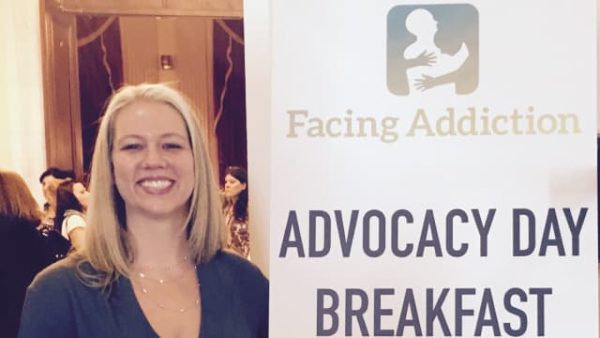CRC student attends national rally, lobbies policymakers

Tens of thousands of people attended the UNITE to Face Addiction launch event held in Washington, D.C.., including Abby Foster, a student and member of the Collegiate Recovery Community at UNC Charlotte.
The purpose of the rally was to raise awareness about the stigma of substance abuse. Seven hundred partners joined together to create the first-ever rally and concert on the National Mall. Performers included Joe Walsh, Steven Tyler, Sheryl Crow and many others.
“Participating in the rally and advocating allowed me the opportunity to be proud and be a representative for those in recovery and to reduce the shame and stigma associated with substance use disorders,” said Foster.
Advocacy Day took place Oct. 5, following the rally. Citizen advocates met with policymakers on Capitol Hill to focus on three issues: the Comprehensive Addiction and Recovery Act of 2015 (CARA), the enforcement of the Mental Health Parity and Addiction Equity Act (MHPAEA) and to seek support of the REDEEM Act.
CARA seeks to expand prevention and educational efforts, the availability of naloxone (an emergency medication to treat drug overdose), resources to identify and treat incarcerated individuals suffering from addiction disorders and disposal sites for unwanted prescription medications. In addition, the act will launch an evidence-based opioid and heroin treatment and interventions program and strengthen prescription drug monitoring programs.
MHPAEA was passed in 2008 to end discriminatory health care practices against those with mental illnesses and/or addictions. Although MHPAEA is already a law, advocates asked for the implementation and enforcement of this law so that individuals living with mental illnesses and addictions will receive needed treatment and services.
The final issue, the REDEEM Act, seeks to restore access to benefits for individuals who have served their time for use and possession crimes and incentivize states to increase the age of criminal responsibility to 18 years old. The REDEEM Act also allows for the sealing and expungement of juvenile records and offers adults a way to seal nonviolent criminal records.
Foster said, “Recovery gave me my voice and this opportunity showed me how I can use my life experience coupled with my education to help combat our nation’s largest public health issue.”